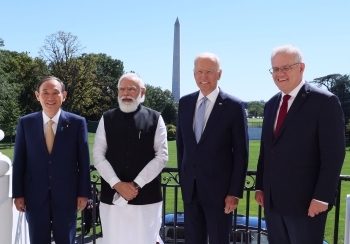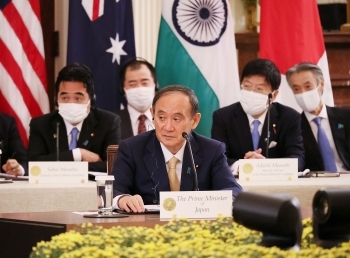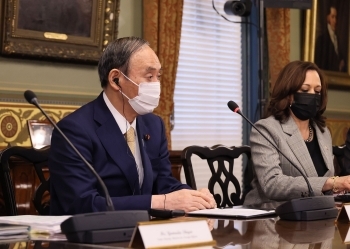Japan-Australia-India-U.S. (Quad)
The Second Japan-Australia-India-U.S. Summit Meeting
 A commemorative photo before the Second
A commemorative photo before the Second Japan-Australia-India-U.S. Summit Meeting
(Photo: Cabinet Public Relations Office)
 The Second Japan-Australia-India-U.S. Summit Meeting
The Second Japan-Australia-India-U.S. Summit Meeting (Photo: Cabinet Public Relations Office)
 The meeting hosted by the Honorable Kamala Harris,
The meeting hosted by the Honorable Kamala Harris, Vice President of the United States of America
(Photo: Cabinet Public Relations Office)
On September 24, commencing at 2:00 p.m. (EDT, on 25, at 3:00 a.m. JST) for approximately 2 hours and 20 minutes, Mr. SUGA Yoshihide, Prime Minister of Japan, during his visit to Washington DC, attended the Japan-Australia-India-U.S. Summit Meeting with the Hon Scott Morrison, MP, Prime Minister of the Commonwealth of Australia, H.E. Mr. Narendra Modi, Prime Minister of India, and The Honorable Joseph R. Biden, Jr. President of the United States of America. After the summit, Joint Statement (English (PDF) / Japanese (PDF)
/ Japanese (PDF) ) and Fact Sheet (English (PDF)
) and Fact Sheet (English (PDF) / Japanese (PDF)
/ Japanese (PDF) ) were released. The overview of the meeting is as follows.
) were released. The overview of the meeting is as follows.
- The four leaders welcomed the in-person Japan-Australia-India-U.S. Summit Meeting held as they concurred at the leaders’ video conference in March this year, as demonstrating the four countries’ strong unity and robust commitment to the Indo-Pacific region, and reaffirmed they will work toward the realization of a “Free and Open Indo-Pacific” for security and prosperity of the region.
- The four leaders shared the view that the four countries share basic values and are committed to reinforcing a free and open international order based on the rule of law. They also concurred to further strengthen the quadrilateral cooperation and to support principles such as the rule of law, freedom of navigation and overflight, peaceful settlement of disputes, democratic values and territorial integrity.
- The four leaders shared the view to continue broadening coordination and building up concrete cooperation with a range of partners, for the realization of a “Free and Open Indo-Pacific.” They also reaffirmed their strong support for the “ASEAN Outlook on Indo-Pacific,” which is ASEAN’s proactive efforts, as well as ASEAN’s unity and centrality. The four leaders also welcomed “EU Strategy for cooperation in the Indo-Pacific.”
- With regard to the response to the COVID-19, which is a pressing challenge facing the international community including, the four leaders affirmed that Japan, Australia, India, and the U.S. play a major role to ensure equitable access to safe, effective, and quality-assured vaccine through vaccine supply and financing, and also concurred that they will continue to work together on the response to the COVID-19, including expansion of vaccine production and its supply to the Indo-Pacific region.And the four leaders released the ”Quad Partnership COVID-19 Dashboard” which compiles the vaccine-related support by the four countries to Indo-Pacific region.
- The four leaders confirmed the steady progress at the working groups on critical and emerging technologies and climate change, which were launched at the leaders’ video conference in March, in addition to the response to the COVID-19, including vaccine cooperation. With regard to critical and emerging technologies, they adopted a statement “Quad Principles on Technology Design, Development, Governance, and Use.”(English (PDF)
 / Japanese (PDF)
/ Japanese (PDF) ) On clean energy, Prime Minister Suga announced Japan’s participation in “Global Methane Pledge,” which is led by President Biden.
) On clean energy, Prime Minister Suga announced Japan’s participation in “Global Methane Pledge,” which is led by President Biden. - The four leaders welcomed the progress in advancing practical cooperation among the four countries in various areas such as quality infrastructure, maritime security, counter-terrorism, cyber security, humanitarian assistance/disaster relief as before. They also concurred to launch working groups on space and cyber security, and to strengthen cooperation in areas of clean energy and people-to-people exchange.
- With regard to the situation in Afghanistan, Prime Minister Suga pointed out that it is extremely important to ensure the safe departure from the country of those who hope to do so. He also stated that it is necessary for countries in the international community to closely coordinate with each other in order not to allow Afghanistan to revert to a hotbed of terrorism ever. The four countries concurred to continue close coordination.
- In the context of the East and South China Seas, Prime Minister Suga expressed serious concern for unilateral attempts to change the status quo by force and coercion. The four leaders concurred to facilitate collaboration to counter challenges to the maritime order based on rules such as international law including United Nations Convention on the Law of the Sea. Prime Minister Suga also stated the basic view of Japan on Hong Kong, Xinjiang, and Taiwan.
- On North Korea, Prime Minister Suga stated that Japan strongly condemned its recent ballistic missile launches as they clearly violated U.N. Security Council Resolutions. The four leaders reaffirmed their commitments to complete denuclearlization of North Korea in accordance with U.N. Security Council Resolutions, urging North Korea to abide by its UN obligations and to refrain from provocations, and called on North Korea to have a substantive dialogue. Prime Minister Suga asked for their understanding and cooperation toward an immediate resolution of the abductions issue, and gained support from each country.
- On the situation in Myanmar, Prime Minister Suga explained that Japan was tenaciously urging the Myanmar military to immediately stop violence, release those who have been detained including State Counsellor Daw Aung San Suu Kyi, and swiftly restore Myanmar’s democratic political system, and stated that it is important that the ASEAN’s “Five-Point Consensus” produce concrete results for the solution. The four leaders emphasized the urgent need to restore democracy in Myanmar, and urged the countries to fulfill “Five-Point Consensus” early.
- The four leaders affirmed to maintain and strengthen the momentum of the cooperation among the four countries, which is heightened by this summit, and concurred to hold the Japan-Australia-India-U.S. summit every year.
- After the summit meeting, Prime Minister Suga and Prime Minister of Australia Morrison had a meeting hosted by the Honorable Kamala Harris, Vice President of the United States of America. At the meeting, Prime Minister Suga stated that this Japan-Australia-India-U.S. summit meeting was extremely fruitful to ensure commitment to the shared vision of a “Free and Open Indo-Pacific,” and expressed his gratitude for Vice President Harris’s husband, Mr. Emhoff’s attendance at the opening ceremony of the Paralympic Games and strong and consistent support from the U.S. for the Olympic and Paralympic Games. Thereafter, they exchanged views on the response to the COVID-19, regional issues, as well as cyber and technology.
(Note 2) COVAX AMC financial commitments, pledges to vaccine dose-sharing and total doses delivered, Last One Mile Support mainly through providing cold chain equipment, COVID-19 emergency assistance such as provision oxygen concentrators, est.


